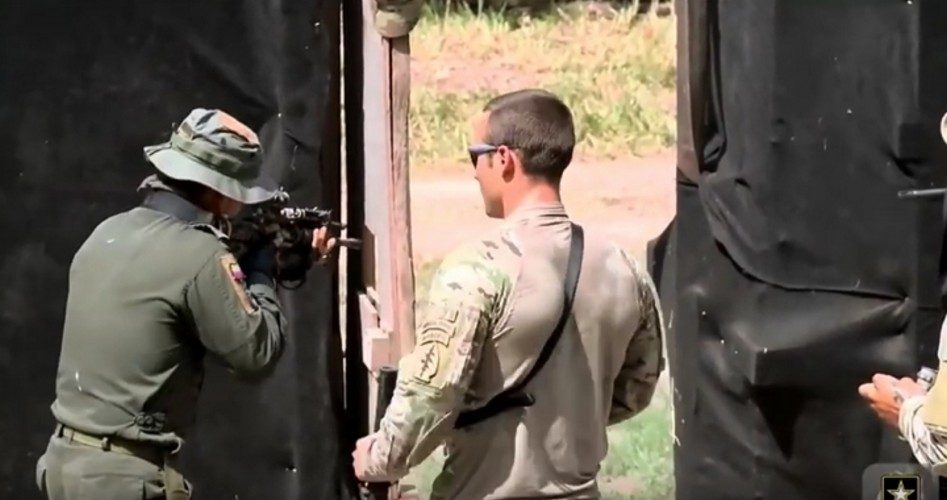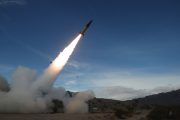
Following President Obama’s announcement in Hanover, Germany, on April 25 that the United States would send an additional 250 special operations forces to Syria in the coming weeks, Pentagon Press Secretary Peter Cook denied that the increase was “mission creep.”
In his announcement, Obama said:
Just as I approved additional support for Iraqi forces against ISIL, I’ve decided to increase U.S. support for local forces fighting ISIL in Syria, a small number of special operations forces are already on the ground in Syria and their expertise has been critical as local forces have driven ISIL out of key areas.
The Obama administration prefers the acronym ISIL, rather than ISIS, for the jihadist group. The president continued:
So given their success I’ve approved the deployment of up to 250 additional U.S. personnel in Syria including special forces to keep up this momentum.
During an April 25 briefing at the Pentagon following Obama’s announcement, Cook fielded questions from a press corps that was naturally eager to learn more details about the expanded U.S. role in Syria.
One journalist asked if we should expect that after these 250 troops are deployed — which will supplement the 50 U.S. forces already in Syria — “will there ever be a period where there will be 300 U.S. boots on the ground in Syria?” Cook replied:
Yeah. I think it’s safe to say that there will be a presence of U.S. forces in Syria doing this kind of work in the — for the foreseeable future. [Emphasis added.]
The journalist asked a follow-up question:
And then where — how close exactly will these 250 be to combat? Will they actually be potentially engaged in combat during this deployment?
To which Cook replied:
Again, they’ll be in support of local forces on the ground. The idea is that they will not be engaged in direct combat, they will not be on the front lines. They will be providing support to those local forces that are taking the fight to ISIL and — but they’re in harm’s way, that — we should be crystal clear about that, and they will be able to defend themselves if they come under fire. But that is not the intent of this deployment.
Another journalist delved into the gradual increase of U.S. forces in both Iraq and Syria, noting that “the secretary [of Defense] announced 217 soldiers would be deploying to Iraq last week. Today, the president announced there’s 250 more are going to Syria,” before asking: “Why the incremental approach?”
Cook answered:
As we talk to our partners, including the government of Iraq. And including our assessment, talking to local leaders on the ground in Syria, these are decisions that we think makes sense to accelerate this campaign and to further enable those local forces.
The journalist then anticipated another increase that has not even been announced yet: “And do you expect another 200 to be announced next week?”
Cook replied:
The secretary has said from the start that these are the next steps in the fight against ISIL and we will be looking — continue to look for opportunities where we might be able to accelerate this campaign further.
We’re going to be meeting with more of our coalition partners, getting their sense of what additional steps could be taken in the future. But, we’re not taking anything off the table at this point. [Emphasis added.]
The journalist then attempted to pin Cook down, repeating: “So you could announce 200 more next week?”
After Cook said, “We’re going to continue to look at every single opportunity we have, worked with our local partners, to see how we can accelerate this campaign,” the journalist asked:
How is this not a mission creep? Just going a little step-by-step, with these steps?
Cook largely avoided providing a straight answer, replying:
Lucas, we are building on what is working and — both in Syria and Iraq. We have seen the momentum in recent weeks, we have seen what has been successful and these actions, these accelerants reflect decisions made based on success on the ground. We want to build on that success.
This latest announcement from Obama is a complete contradiction of what he said at a press conference in Costa Rica in May 2013. At that conference, when he was asked about the possibility of sending troops to Syria, Obama replied:
As a general rule, I don’t rule things out as commander-in-chief because circumstances change and you want to make sure that I always have the full power of the United States at our disposal to meet American national security interests.
Having said that, I do not foresee a scenario in which boots on the ground in Syria, American boots on the ground in Syria would not only be good for America, but also would be good for Syria.
The turmoil in Syria originally began when a collection of rebel forces became engaged in an uprising against Syrian dictator Bashar al Assad, starting in 2011. By 2012, this uprising had escalated into a civil war, with an assortment of rebel forces fighting against the Assad government troops (and sometimes each other) for control of Syria. Though our government labeled some of these forces as “moderate” rebels and provided aid to them, the anti-Assad forces also included radical jihadists connected to al-Qaeda and even ISIS.
It was eventually revealed that U.S. support for the supposed “moderate” rebels actually helped to strengthen ISIS and build it into the major threat to peace that it has become today. As was noted in The New American article, “ISIS: The Best Terror Threat U.S. Tax Money Can Buy,” last year:
Indeed, without the U.S. government and Obama’s “coalition” of Sunni Islamist strongmen, the “Islamic State” would probably not exist — much less have the resources, weapons, manpower, and training needed to seize enough territory to create a “Caliphate” (Islamic Empire) of barbarism across large swaths of Iraq and Syria….
In fact, at least two of the administration’s top officials — Vice President Joe Biden and Joint Chiefs of Staff Chairman General Martin Dempsey — have publicly discussed the role of Obama’s “anti-ISIS” coalition in building up the terrorist group.
Biden criticized the wealth of money and weapons sent to the “moderate” anti-Assad rebels and noted:
Where did all of this go? So now what’s happening? All of a sudden everybody’s awakened because this outfit called ISIL, which was Al Qaeda in Iraq, which when they were essentially thrown out of Iraq, found open space in territory in eastern Syria, work with Al Nusra who we declared a terrorist group early on, and we could not convince our colleagues to stop supplying them.
While Biden’s statements were essentially true, they conveniently ignored an important fact. It was not only “our colleagues” who supported the rebels and helped ISIS, it was also our own CIA and State Department.
ISIS first gained power in Iraq, filling the vacuum left in the country after our government removed another strongman, Saddam Hussein, from power. As was noted in another article posted by The New American, on June 15, 2014: “Over the last week, al-Qaeda-linked jihadists styling themselves the “Islamic State of Iraq and the Levant” (ISIS) receiving weapons and taxpayer funding from the Obama administration in Syria have seized control in wide swaths of Iraq.”
After establishing a formidable power base in Iraq, ISIS forces moved into Syria, joining the anti-Assad rebels there.
Now our interventionist chickens have come home to roost, and our government is escalating its presence in both Iraq and Syria to combat a terrorist organization that we, ourselves, helped come to power.
One wonders if the cycle of U.S. intervention overseas, our destabilization of regimes, and sending forces to fight the terrorists who threaten the destabilized countries will ever end.
Related articles:
ISIS: The Best Terror Threat U.S. Tax Money Can Buy
In Syria, Obama-backed “Rebels” Battle Obama-backed Militias
Blair Calls for West to Send Ground Troops Against ISIS
U.S. Allies in Syria are Now Fighting Each Other
Anti-ISIS Coalition Built ISIS (Video)
U.S. Intel: Obama Coalition Supported Islamic State in Syria
Pentagon Modifies Syrian Rebel Training, Drawing U.S. Further Into War
Another Rebel Division Trained by Obama Joins Al-Qaeda
U.S. Intel: Obama Coalition Supported Islamic State in Syria
Al-Qaeda Splinter Group’s Insurgents Overrun Mosul, Iraq
In Iraq, U.S. Foreign Policy and Obama’s “Rebels” Strike Again
Jesuit Priest Murdered in Syrian City of Homs
Christians in Mosul, Iraq, Pay “Protection” Tax
Obama Helped ISIS in Syria, Now Fights It in Iraq
U.S. Bombs 41 $250,000 Humvees Captured by ISIS
British SAS Forces in Syria Disguise Themselves as ISIS Fighters
Top Syrian Rebel Group Merges With Al-Qaeda in Iraq
Obama’s “Anti-ISIS” Coalition Built ISIS, Biden Admits
Obama Helped ISIS in Syria, Now Fights It in Iraq
ISIS Seized $1 Billion of U.S. Military Aid, Iraqi Leader Admits
U.S. Intel: Obama Coalition Supported Islamic State in Syria
The War on Terror Is Creating More Terror
The Disasters That U.S. Intervention Created



